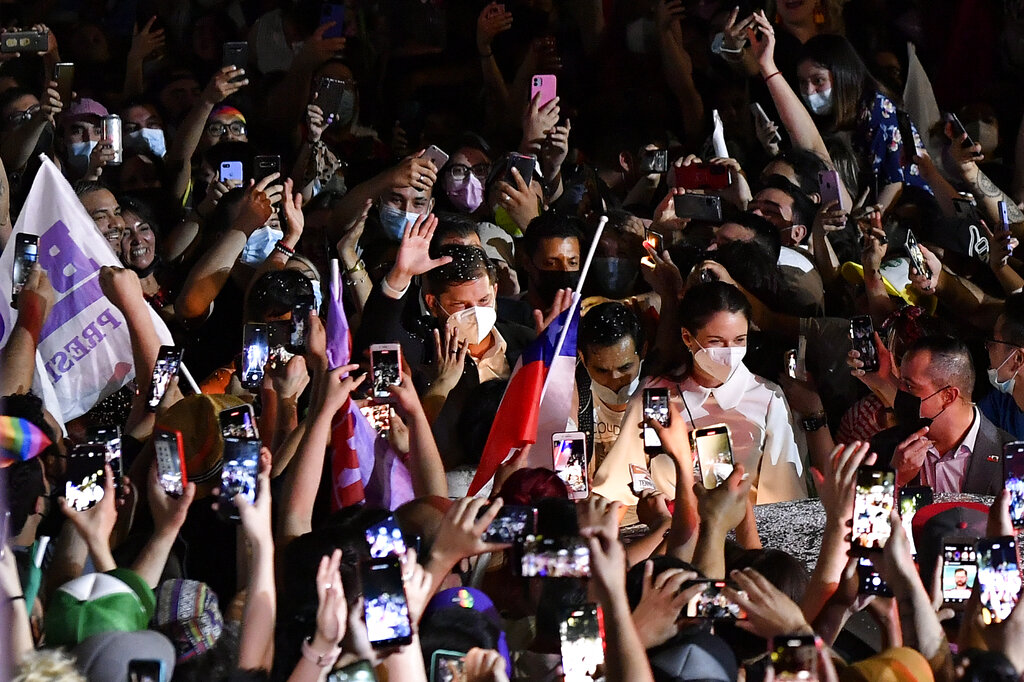Commentary
A message to the world from Chile
The victory of the left was a vote of revolt, a turning point that affects us directly. The winner in Chile was a coalition of radical leftists.

This is truly good news. Gabriel Boric, 35, a deputy and former leader of student protests, has been elected president of Chile. Boric received 56% of the vote, defeating his rival Jose Antonio Kast, a fascist-Pinochetist and an open supporter of the bloody military coup that brought down the democratic government of “comrade president” Salvador Allende in September 1973.
There was cause for concern after the extreme right candidate won the first round of the presidential elections—we wrote on Sunday about “Pinochet’s shadow,” while at home the racist Salvini expressed his hopes for the victory of the fascist Kast, “for the sake of order.” But the darkness was in the process of being dispelled, starting with the “yes” vote a year ago to the new Constituent Assembly, and now, with the overwhelming victory of Boric, new light has been shed after half a century of conflict, in Latin America and not only.
The vote was an expression of revolt, a turning point that also directly concerns us. In the meantime, it’s a rallying call for the leftist forces and opposition movements on the Latin American continent. Starting with Pinochet’s coup, through the infamous Condor Plan that fully involved the intelligence services of the various U.S. administrations, the continent saw the rise of military dictatorships in the key points of crisis, from Argentina to Uruguay and Bolivia, while the military had already taken power in Brazil in 1964. There as well, as in Chile, the arrival of center-left forces in government was not enough to bring about a change in the management of power and the egalitarian transformation of society.
In the meantime, the experiences central to understanding the world political crisis are no longer being kept in isolation from each other—such as that of Venezuela, where a progressive turnaround was built not only by the charisma of Chavez, but also by the advent of a vast protest movement that developed throughout the 1990s; or revolutionary Cuba, under siege and fighting for survival, not only as a result of a criminal U.S. embargo also perpetuated by the new Biden administration, but also due to the difficulties in managing the new and decisive economic reforms.
The breakdown of isolation and the opening of new perspectives also applies to Brazil, now in the grip of the populist proto-fascist Bolsonaro, who came to power after a period of media-driven and vigilantist destabilization, a veritable “white coup” against the democratic rule of Lula. But the message also applies to us on the Old Continent, as we confront the situation of our “real” European Union, inauspiciously created on the basis of a currency that was intended as the only “unifying” glue, and built flawed according to the logic of the primacy of the markets and the fiscal compact, imposed even in national constitutions; a Europe where the criticism of neoliberalism and the centrality of the market and its choices is struggling to gain traction, and is almost forced to take advantage of the tragedy of the pandemic in order to have a voice and be heard.
And in particular, the Chilean turning point is also arriving—or should arrive—in Italy. The winner in Chile was a coalition of radical leftists, Apruebe Dignidad (Support Dignity – a name with historic roots, as Pinochet had named “Dignidad” a prison colony for his opponents), including the Communists, who conspicuously failed to “commit suicide” as a party, a coalition that has led the struggle against privatization and neoliberalism and which, because of its credibility, has also won most of the decisive centrist vote. Meanwhile, in Italy, “the left that we have known no longer exists,” eternally caught up in compromise and power-seeking; while that in opposition is also disappearing, dispersed in a thousand conflicting pieces. And how can we forget that here, in Italy, the Chilean experience has left deep marks in the evolution of our recent history?
Berlinguer’s historic compromise, as opposed to the left united in government, was, among other things, a political response—presented as “necessary”—to the very strong danger of a Chilean outcome for Italy, which still had a vast protest movement born with the student struggles of 1968, which became structural only with the coming into the field of a great labor movement in 1969. It did not take long for the repression and violent provocations against it to arrive, with a militaristic period of neo-fascist massacres orchestrated within the central apparatus of the state. And even the ill-advised choice on the part of a marginal and minority part of that movement to resort to the expedient of “armed struggle” was, in the logic of those who chose it, a “justifiable response” (albeit ill-chosen, ill-considered and losing from the start) to the violent defeat in Chile.
But the strongest lesson that comes from the turning point in Chile, again as a reflection of that history, concerns the current world crisis and the fate of the new generations. Because Pinochet’s dictatorship was not a “traditional” fascist dictatorship, but the first worldwide experiment, paid for by the Chilean people, of the model of “authoritarian neoliberalism” that would become dominant at the end of the 20th century and also in the new century underway. A model that employed the “work” of the economic school of the Chicago Boys, the economists led by Milton Friedman.
In Chile, the young generation has now won—the one which has fought against center-right and center-left governments, often paying with their lives, against the privatization processes that have affected schools, health care and the welfare system, starting with pensions, reducing Chileans—and the Latin American continent—to poverty and building a system of inequalities that lured people in by spreading the individualistic ideology of “choosing freedom.” Thank you, Chile.
Originally published at https://ilmanifesto.it/il-messaggio-che-viene-dal-cile/ on 2021-12-21
